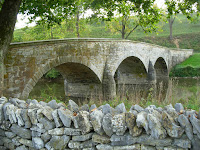This Civil War battle was the
result of Confederate General Robert E. Lee’s first invasion of the North in
September of 1862.
One day of intense fighting
turned the Antietam battle into one of the bloodiest of the war—second only to
Gettysburg in devastation.
 |
| Bodies after the battle. |
Lee’s troops met the Union
army at Antietam Creek * on the 17th near the small town of
Sharpsburg in Maryland. A staggering 23,100 men were wounded, killed or were
missing in action after these two armies collided in cornfields and farmlands.
* In 1933, the National Park
Service took over this site making it a National Park.
Lee’s troops had reached this
road and stayed, thinking at first it provided some protection. Soldiers on both
sides fired continuously as the Union soldiers tried to take the position.
Finally, the Confederate
soldiers were overrun—bodies fell on top of bodies along this bloody road.
 |
| Part of the Sunken Road now known as Bloody Lane. |
Today this road is called Bloody Lane. People who visit it claim
it leaves an eerie impression. For no matter how many visitors roam this old
road on any given day—it remains deathly quiet.
Many modern-day visitors have
experienced strange activity along Bloody Lane. The sounds of gunfire and the
smell of gunpowder are reported when no one is around.
One male visitor to Antietam National Battlefield spotted several men wearing Confederate uniforms as he walked Bloody Lane.
At first, he thought they were war re-enactors but then he saw them vanish.
Another strange encounter
occurred when a group of Baltimore schoolboys visited the lane. They heard
singing out in the fields. They described it as a chant or the Christmas song Deck the Halls.
They heard Fa-la-la-la-la
sung repeatedly.
Their encounter is telling in
that during the battle an Irish brigade charged the Confederates near the
observation tower located along Sunken Road. These Irish soldiers battle
cry was in Gaelic and sounded like a Christmas carol.
 |
| Observation tower along Sunken Road. |
 |
| Burnside bridge |
Another active area on the
battlefield is Burnside’s Bridge. It was here that General Ambrose Burnside
finally pushed the Confederate troops back after several previous attempts.
Many soldiers were buried
quickly near this bridge in unmarked graves.
At night, visitors near this bridge report seeing a strange glowing blue light moving around the area. Others
report hearing the cadence of a drum playing—this sound fades away into the
distance.
 |
| Ghostly mist captured by one canon. Photo by Belinda Franks |
Today five upside down canon
barrels mark the spots where five generals died during the battle. Photographs taken in these areas sometimes have strange mists or light anomalies in them.
It appears some of the
soldiers who perished during the Antietam Battle are more than just a memory.
Two houses-- the Pry House and
the Piper House both stand on the battlefield. These structures are haunted as
well.
Witnesses report hearing
footsteps on the stairs and seeing apparitions.
The Pry House was where Union
Maj. General George B. McClellan made his headquarters. A woman seen in this
house is believed to be Francis the wife of General Richardson.
 |
| Pry House as it appeared during battle. |
Richardson was wounded during
this battle and Francis nursed him on his deathbed.
Another structure near the
battlefield in Sharpsburg is the St. Paul Episcopal Church. This building was
used as a Confederate hospital following the battle.
Members of this church have
heard screams, which they believe to be the southern soldiers who were wounded
and dying in this makeshift hospital.
Other witnesses have seen
lights flickering on and off in St. Paul’s tower.
Excerpts used in this post are from an article
written by Rickie Longfellow a member of the West Licking Historical Society.
Here is a stark collection of Then and Now photos taken at Antietam. Warning: many are graphic in nature.
Here is a stark collection of Then and Now photos taken at Antietam. Warning: many are graphic in nature.

No comments:
Post a Comment